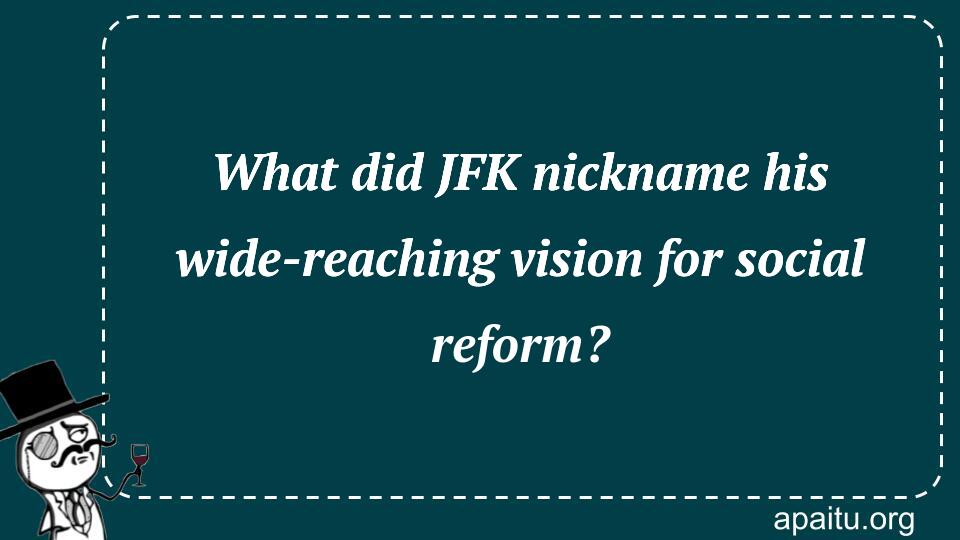Question
Here is the question : WHAT DID JFK NICKNAME HIS WIDE-REACHING VISION FOR SOCIAL REFORM?
Option
Here is the option for the question :
- New World
- New Era
- New Frontier
- New Paths
The Answer:
And, the answer for the the question is :
Explanation:
In 1960, when John F. Kennedy accepted the nomination for president offered by the Democratic Party, he presented a novel concept that he called the ‘New Frontier.’ The phrase did not relate to any particular laws, but rather covered the President’s vision to defend the newly acquired rights of African Americans, combat ‘ignorance and prejudice,’ and develop innovative ways to alleviate poverty.

John F. Kennedy, the 35th President of the United States, was known for his charismatic leadership, forward-thinking policies, and ambitious vision for social reform. It was under his administration that a new era of progress and possibility was ushered in—a vision that he aptly named the New Frontier. The New Frontier encapsulated Kennedy’s bold and wide-reaching agenda, encompassing a range of initiatives aimed at transforming American society, promoting equality, and advancing the nation’s standing in the world.
Kennedy’s New Frontier was rooted in the belief that America had reached a critical juncture in its history, requiring fresh ideas and innovative solutions to address the challenges of the time. In his inaugural address in 1961, he famously declared, “Let the word go forth from this time and place, to friend and foe alike, that the torch has been passed to a new generation of Americans.” With these words, he signaled a departure from the past and a commitment to forging a new path forward.
At the heart of the New Frontier was a dedication to social justice and equality. Kennedy sought to break down the barriers that hindered progress and limited opportunities for marginalized groups. He championed civil rights, aiming to end racial segregation and discrimination. His administration supported the Civil Rights Act of 1964, which would later be passed under President Lyndon B. Johnson, and he deployed federal troops to protect African American students during the integration of the University of Mississippi.
Education was also a key pillar of the New Frontier. Kennedy recognized that providing quality education for all Americans was essential for individual empowerment and national progress. He launched initiatives to improve educational standards, expand access to higher education, and promote scientific and technological advancements. The establishment of the Peace Corps, which encouraged young Americans to serve in developing countries, was another manifestation of Kennedy’s commitment to education and global engagement.
Furthermore, Kennedy’s New Frontier encompassed economic reforms aimed at stimulating growth and reducing poverty. He advocated for tax cuts to spur investment and job creation, as well as increased funding for social welfare programs. The proposed legislation to create Medicare, which would provide healthcare for the elderly, and the War on Poverty, which aimed to address systemic poverty through economic opportunity, were emblematic of Kennedy’s commitment to combating inequality and uplifting the most vulnerable members of society.
Kennedy’s vision for the New Frontier extended beyond domestic affairs. He recognized the need for the United States to assert its leadership on the global stage, particularly in the face of Cold War tensions. He called for advancements in science and technology, including the ambitious goal of landing a man on the moon before the end of the 1960s. The establishment of the